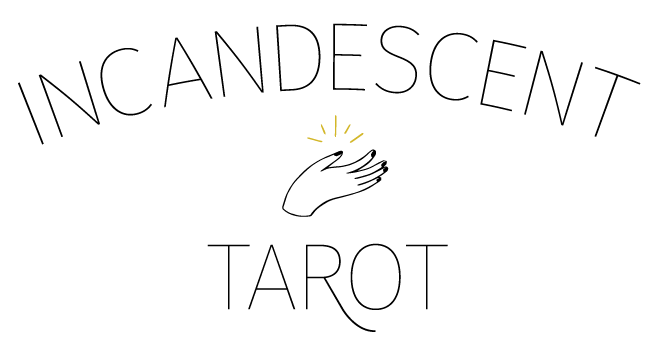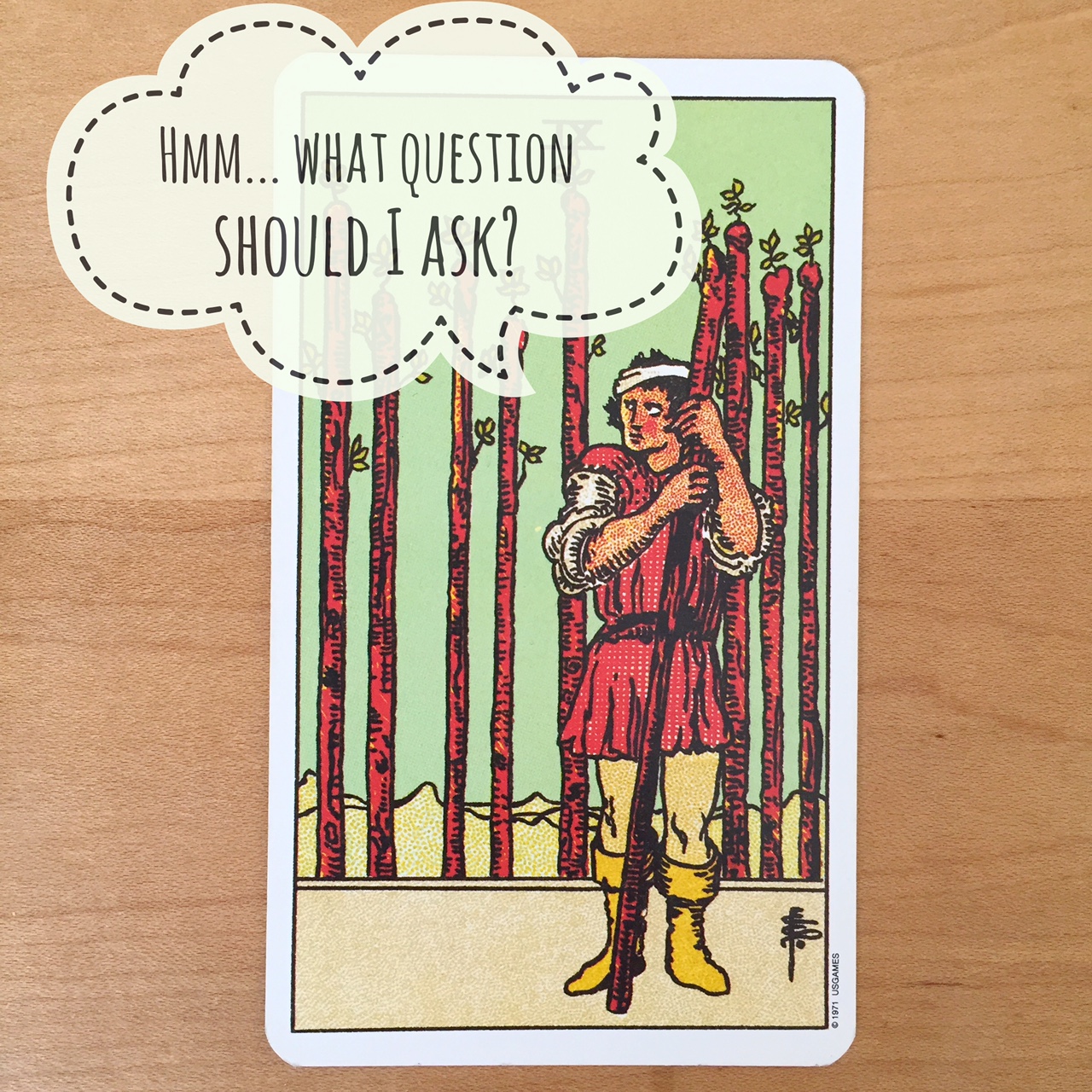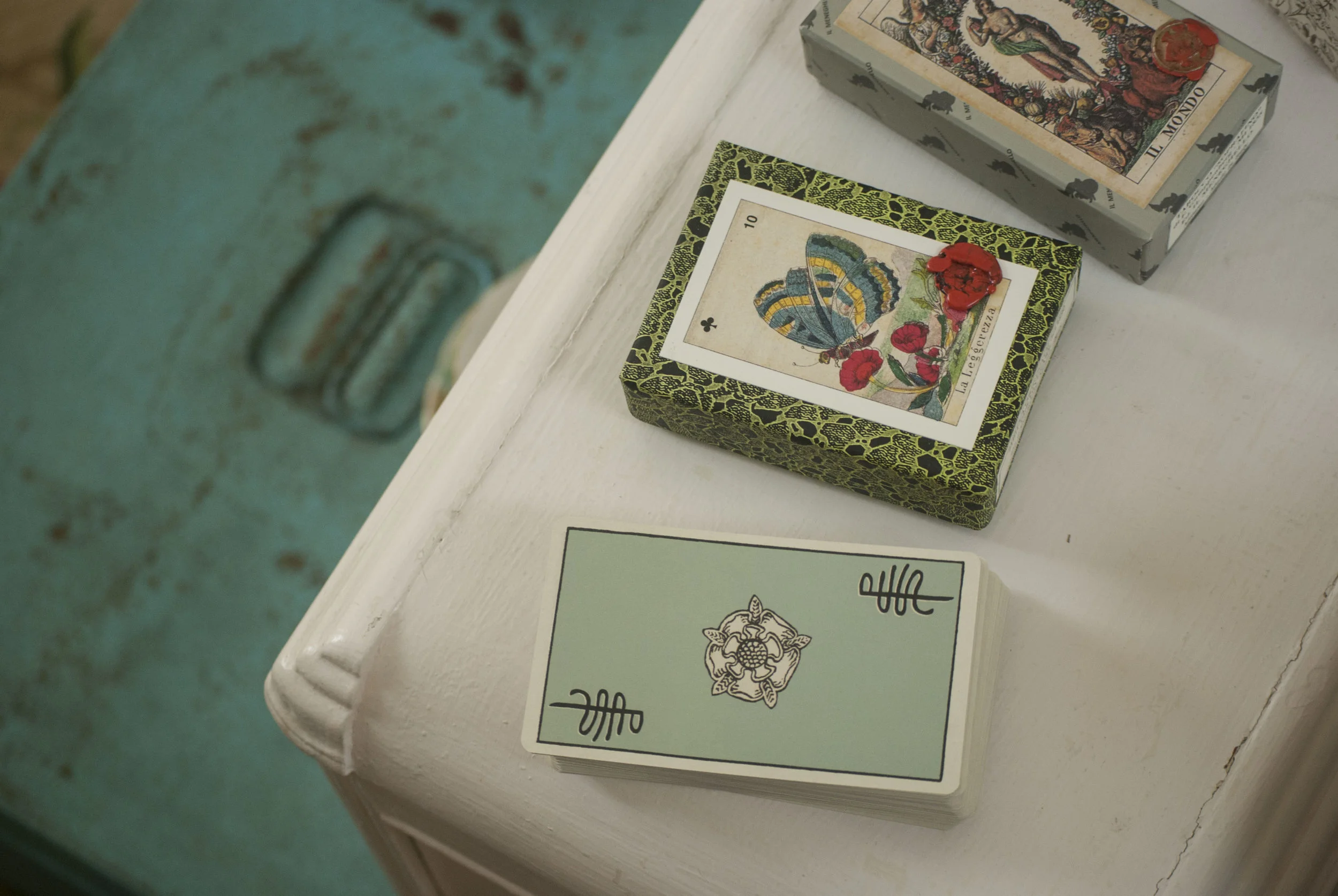3 Tips to Phrase Questions for Tarot Readings
Will I meet a tall, dark stranger? When will I get a promotion? What are the winning lottery numbers for this week?
Hmm... is she being facetious? Why yes I am! These types of questions aren't suited for the tarot. Here's why.
Tarot works best as a map or forecast of the present situation. It does not do well with yes or no questions (and what’s the fun in that?), inquires into the affairs of other people, or specific timetables. Because we are constantly changing and our choices affect where we end up – thank goodness! – the future is never guaranteed. We can, however, see what general direction we’re heading in based on how we’re living now.
But fear not. Maybe you are curious about that tall dark stranger. There are many ways to reframe your question to get pertinent information about the situation.
I’ve outlined three tips to help phrase your tarot questions to get a clear and accurate reading.
1. What do I need to know about…
Use this phrasing to open up a narrow question. If you want to know about that alluring man you just met change you question accordingly:
Is Mr. Handsome interested in me? --> What do I need to know about my growing relationship with Mr. Handsome?
Why it works: Instead of focusing on outcome (yes or no) this question focuses on you and the present moment. It’s much more constructive. With this reading you're not waiting for the yes or no prediction to come true. You get to see how your outlook and actions influence your relationship. Now there’s something you can work with!
2. How and Why
Use how and why to expand on the journey ahead (how) and your motivations (why). For example, say you want to move and are wondering when you’ll get your act together.
When will I move? --> How will my move unfold?
Why it works: the reading will reflect the process of moving – including your motivations, fears, incoming energies, etc. - allowing you to gain understanding of the things working for and against you. With this you can gain an idea of how long it can take and give you the opportunity to make changes to slow down or charge full speed ahead.
3. Focus on Yourself
You may be tempted to ask the tarot about another person. You’re dying to know what your aloof coworker thinks of you. Why not ask the tarot? I don’t think so. Not only is this a fairly shifty thing to do, but it also bypasses the true connection that you as the seeker have with the cards. Use this to your advantage like so:
What does Trisha think of me? --> Why am I concerned about Trisha’s opinion?
Why it works: You’re refocusing the question back on yourself, the place where you can make the most change. The cards will truly reflect your situation and not overstep into speculating about Trisha’s. If you're thinking that sounds like a boring reading to get, you're right. This exercise helps identify which questions are worth asking tarot. You might want to change your question and choose something more pertinent to you. Good boundaries = good readings.
To Recap
DO Broaden the focus to the whole situation by avoiding yes and no questions.
DO start your question with “how” and “why” to get the most information.
DO keep it about yourself in readings about relationships with other people.
DON’T limit yourself with fatalistic yes and no questions.
DON’T fixate on specific timelines.
DON’T ask for lottery numbers ;)
Still curious about questions? Stuck on something you’re trying to phrase? Let me know in the comments below.
For more information on the uses and limitations of tarot see my FAQ and Code of Ethics.
Feel like you're got the perfect question you want to explore? I'd love to help answer it! Book a reading with me here.
8 Books to Get You Started on Your Tarot Journey
So you have a tarot deck (or two, or three - I know how it goes!)
Now what???
Things have changed a lot since I was an awkward teenager first discovering the tarot. Picture me lurking in my bedroom late at night with my trusty Rider-Waite-Smith deck and two dog-eared books and you get the picture.
So you have a tarot deck (or two, or three - I know how it goes!)
Now what???
Things have changed a lot since I was an awkward teenager first discovering the tarot. Picture me lurking in my bedroom late at night with my trusty Rider-Waite-Smith deck and two dog-eared books and you get the picture.
A few gems to get you started
In a way, the limitations of the time were helpful. Without lots of book choices on Amazon or card meanings online I was able to focus on the information I had with me. Now I have to sit on myself to avoid spending too much on books or getting sucked into an internet vortex. Sometimes I’m successful, and sometimes… not so much.
So my perhaps old-timey recommendation? If you’re starting out, grab a book or two and really get to know them. Practice with lots of readings and thumb through to the meaning of each card. Notice what rings true to you and what confuses you. Write it all down. I can’t overstate the usefulness of a tarot journal.
You’re well on your way to tarot proficiency!
Here are the books that guided me on my journey, as well as some newer additions that can do the same for you.
Learning the Tarot: A Book for Beginners by Joan Bunning
I started out on this book and it is wonderful. A comprehensive tarot course with succinct and accessible card definitions perfect for the beginner. This one is concise and easy to navigate with helpful sections on cards that compliment each other and just enough information to get you started without overwhelming you. Joan Bunning also offers the course for free on her website here, though I recommend supporting her wonderful work and enjoying the feel of a book in your hands.
Seventy-Eight Degrees of Wisdom by Rachel Pollack
I adore this book. It’s like an old friend I will never get tired of having tea with. Filled with wonderful insight and deep meaning, do yourself a favor and pick it up. There’s a reason why this is sometimes referred to as the “Bible of tarot.” Pollack’s immersive writing style and serious tarot chops make each page a fountain of insights. It has a more spiritual and historical orientation, but is never overly-dense or dogmatic. After reading it you feel deeply connected to the cards on multiple levels.
the creative tarot: a modern guide to an inspired life by jessa crispin
For those of you who want a less-woo, more focused look at the tarot, Jessa Crispin’s book offers a creativity-centered approach to the cards. Her writing is incredibly clear and engaging and she illustrates how to use the cards to tap into the creative process. Each card meaning connects to artists with inspiring connections to their lives and concludes with recommendations of songs, paintings, plays, and films for further insight.
Tarot Wisdom by Rachel Pollack
As anyone who’s studied tarot for a long time will tell you, you never stop learning! In this book, Rachel Pollack returns to the cards and shares what she’s learned since the publication of Seventy-Eight Degrees of Wisdom. Expect more beautiful and insightful tarot interpretation put together in a masterful, easy-to-follow way. This book is very in-depth and incorporates many other mystical traditions into tarot. I suggest getting this after you’re familiar with Seventy-Eight Degrees of Wisdom only because it’s easy to get carried away with this much magic.
Holistic Tarot by Benebell Wen
What a tome! This book is packed with card meanings and much, much more. Inside you’ll find a wealth of spreads and explorations into the history, uses, and philosophy behind tarot. And pretty much anything else you want to know about the practice. The only caveat? It’s a lot to digest. For those looking to dip their toes in, this book can be a little too much too soon, but if you’re the kind who wants all the information in one book, this is the one for you!
The Tarot: History, Symbolism, and Divination by Robert M. Place
My favorite book on the history of tarot. If you’re persnickety about historical accuracy and want to cut through the occult legends and myths around tarot pick this one up asap. Place’s scholarship is excellent and clarifies many of the misconceptions about tarot’s origins with clarity and respect. His explorations of the meanings of the Marseille and R-W-S systems are very enlightening, too, and this book makes for an excellent reference you’ll turn to again and agan.
The Encyclopedia of Tarot vol. 1 by Stuart Kaplan
Decks, decks, and more decks! A great resource on tarot history and, you guessed it, tarot decks. From the Medieval origins of the tarot through the twentieth century, this book has all the information and illustrations you need. Helpful for those curious about the evolution of tarot as well as those interested in collecting. Start with volume one for a useful intro, and add others as your journey progresses. The extensive photos also help curb excessive deck purchases…
modern tarot: connecting with your higher self through the wisdom of the cards by michelle tea
A newer addition, this book has a wonderfully approachable tone and engaging anectdotes from the author’s life and tarot journey that help the reader better understand the cards and how they apply to real life situations. What’s more, each card meaning is followed by a spell or ritual you can do to deepen your practice. It’s a jaunty, fun read for the witchier tarot seekers out there.
How about you? What books have helped you on your journey with tarot?
Is Tarot Right for Me?
Sometimes it takes a while to start something new.
You’ve been intrigued by tarot for a bit, maybe even walked into a metaphysical shop to look at the decks. If you’re like me, you probably got overwhelmed fast. Let’s see what we have here… Medieval Tarot, Cat Tea Party Tarot, Steampunk World of Warcraft Wolf Tarot???
Yes, it’s a lot to process! And you might start wondering if tarot is a good fit for you after all.
As an unabashed tarot nerd, I have good news for you. If you’re interested in tarot, get a deck and start exploring now.
You don’t need a long lineage of fortunetellers in your family, an “angels descending from the clouds” spiritual awakening, and you certainly don’t need to pass a test.
Your curiosity is pointing you in a very exciting direction. Why not follow it and see where it leads?
It doesn’t matter what your spiritual background is, or if you’re even planning to use tarot as a spiritual tool at all. I believe that tarot benefits people of all stripes (or spots) and is very adaptable. So if you plan to use tarot for divination or you just want to use the images to jog your creativity, please go out and snag a deck.
The world could use your unique take on the tarot, so don't hold yourself back.






